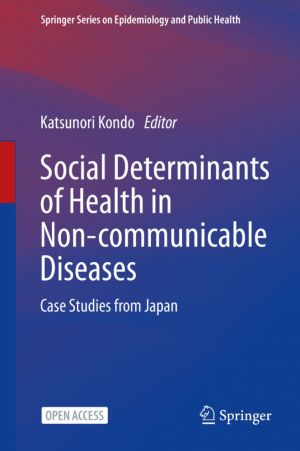Social Determinants of Health in Non-communicable Diseases
Case Studies from Japan
by Katsunori Kondo
DescriptionDetailsHashtagsReport an issue 






Book Description
This open book is the first compilation that reviews a wide range of social determinants of health (SDHs) for non-communicable diseases (NCDs) and healthy ageing in Japan. With the highest life expectancy and the largest elderly population in the world, Japan has witnessed health inequality by region and social class becoming more prevalent since the 2000s. The first half of this volume describes in detail major NCDs, such as cancers, heart and kidney diseases, diabetes, stroke, and metabolic syndrome. The second half, on the other hand, explores various SDHs relating to healthy ageing. All chapters review and focus on SDHs, particularly health inequality associated with socio-economic status and social capital, which are widely addressed in the field of social epidemiology. The book makes the argument that "Health for All" advocated by the WHO should be implemented based on social justice and benefits for the greater society. Public health researchers and policymakers, both in Japan and other nations, will gain scientific evidence from this book to prepare for the coming era as ageing becomes a global issue.This open book is licensed under a Creative Commons License (CC BY-NC-ND). You can download Social Determinants of Health in Non-communicable Diseases ebook for free in PDF format (7.5 MB).
Book Details
Title
Social Determinants of Health in Non-communicable Diseases
Subject
Economics and Finance
Publisher
Springer
Published
2020
Pages
328
Edition
1
Language
English
ISBN13
9789811518300
ISBN10
9811518300
ISBN13 Digital
9789811518317
ISBN10 Digital
9811518319
PDF Size
7.5 MB
License

Related Books

This stimulating open access volume details the innovative work of the Pan Institution Network for Global Health in creating collaborative research-based answers to large-scale health issues. Equitable partnerships among member universities representing North America, Africa, Asia, and Europe reverse standard cross-national dynamics to develop loca...

This open book explores ways to leverage information technology and machine learning to combat disease and promote health, especially in resource-constrained settings. It focuses on digital disease surveillance through the application of machine learning to non-traditional data sources. Developing countries are uniquely prone to large-scale emergin...

This volume explores interdependencies between knowledge, action, and space from different interdisciplinary perspectives. Some of the contributors discuss knowledge as a social construct based on collective action, while others look at knowledge as an individual capacity for action. The chapters contain theoretical frameworks as well as experiment...

This free book examines the triangle between family, gender, and health in Europe from a demographic perspective. It helps to understand patterns and trends in each of the three components separately, as well as their interdependencies. It overcomes the widely observable specialization in demographic research, which usually involves researchers stu...

This open book explores the role of the ILO (International Labour Organization) in building global social governance from multiple and mutually complementary perspectives. It explores the impact of this UN´s oldest agency, founded in 1919, on the transforming world of work in a global setting, providing insights into the unique history and functio...

This book is the first to develop explicit methods for evaluating evidence of mechanisms in the field of medicine. It explains why it can be important to make this evidence explicit, and describes how to take such evidence into account in the evidence appraisal process. In addition, it develops procedures for seeking evidence of mechanisms, for eva...

